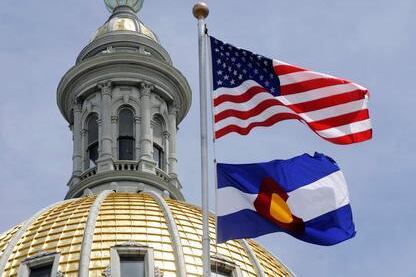A group of Democratic lawmakers is pitching a Colorado tax code change that it says would bring in hundreds of millions and offset cuts to education.
Reps. Emily Sirota and Matt Gray said in a Monday interview they plan to introduce the Fair Tax Act bill that would eliminate certain tax deductions for big businesses and high earners.
The money would be used to protect K-12 education from cuts brought on by a projected $3.3 billion revenue shortfall next year. Colorado lawmakers are spending about 15% less on K-12 education in the 2020-21 budget than they had expected to, and average per pupil spending will decline about 5%. Lawmakers are also working on tax changes in future years that would prevent cuts down the line.
Democrats believe they can raise an estimated $278 million in general fund revenue through the Fair Tax Act bill, according to a summary of the bill. Gray said the tax code changes, sponsored in the Senate by Democratic Sens. Dominick Moreno and Chris Hansen, would begin to help the state generate more funds next fiscal year.
Gray said the money would go to K-12 education “to stave off some of the horrible cracks that we otherwise are going to have to approach.”
Sirota and Gray said they want to protect small businesses and taxpayers by targeting only certain codes that impact the most wealthy Coloradoans.
The tax code amendments would include removing deductions for large businesses allowed under the federal Tax Cuts and Jobs Act of 2017 and not allowing certain coronavirus relief bill deductions for big businesses and the state’s highest earners.
“We are just saying for Colorado, we’re not going to do that within our state tax code,” Sirota said.
The proposal comes as the Senate moves forward bipartisan legislation to ask voters to repeal the Gallagher Amendment.
Neither proposal would generate as much money as a $600 million emergency tax that some education groups and tax reform advocates had wanted to protect against the worst of the pandemic’s effects.
Members of Democratic leadership have dismissed the idea as politically unfeasible, with Republicans balking at the emergency measure. Passing an emergency tax or referring a tax increase to the ballot would both require a two-thirds majority. The proposed tax code changes could pass with a simple majority, which Democrats have.
Backers of the emergency tax are also collecting signatures to place a graduated income tax on the November ballot, a proposal they are also calling a Fair Tax. It would lower income taxes for most Coloradans but increase them for those earning more than $250,000.
Elliot Goldbaum of the Colorado Fiscal Institute, which is backing income tax changes, said in an email that he wants to see the Gallagher amendment repeal on the ballot, along with the graduated income tax proposal that would have higher-income Coloradans pay more.
He said lawmakers should send both measures to the voters, rather than “picking and choosing.” Just repealing Gallagher is a partial solution, he said.
The repeal of Gallagher, adopted in 1982, would prevent a major loss of local tax revenue in future budget years and ease the state’s burden of K-12 funding.
As the value of residential property has grown, lawmakers have pushed the residential assessment rate — which determines how much of a property’s value is taxable — down as a way to maintain balance in the ratio. That’s shifted the tax burden to commercial property owners who have a fixed assessment rate.
The declining residential rate also has left many small fire, library, and hospital districts, especially in rural areas, that are reliant on the tax collections struggling to maintain basic services.
Bill sponsor state Sen. Jack Tate, a Centennial Republican, on Monday framed the repeal as a rural issue that will benefit businesses and small towns that struggle to pay for services.
And Hansen, a co-sponsor of the bill, said without a repeal, Gallagher’s requirements are “going to hammer K-12 education.“ The state is looking at an almost $500 cut to education without changes in 2021-22.
“We would be doubling the shortfall K-12 is up against,” Hansen said.





